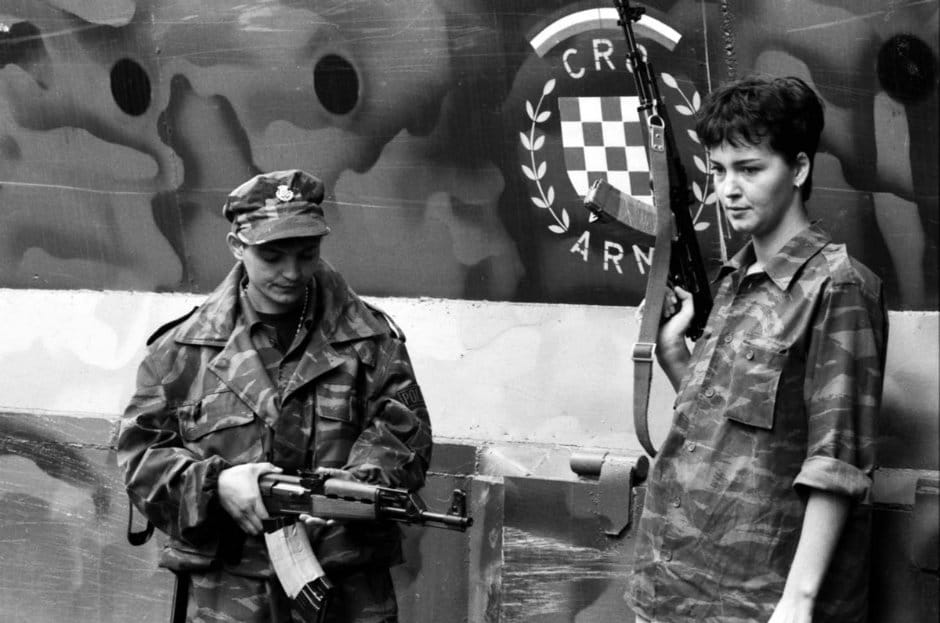“This Had To Be Done By Mothers Alone”: Research Notes on the Expansion of Women’s Agency During the Croatian Homeland War

Published 2024-05-09
Keywords
- Women's history,
- agency,
- activism,
- human rights,
- Croatian Homeland War
Copyright (c) 2024 Matthew Cerjak (Author)

This work is licensed under a Creative Commons Attribution-NonCommercial-NoDerivatives 4.0 International License.
How to Cite
Abstract
In the years prior to, during, and after the Croatian Homeland War (1991-95), thousands of women answered the call to serve their nation. This research note offers a preliminary exploration of their stories. Initial discoveries show that Croatian women created pre-war networks attempting to prevent war, defied restrictive gender norms by serving in the military during the war, and utilized their wartime service to enhance women’s political representation after having endured unspeakable wartime atrocities. Emphasizing their pivotal roles in reshaping societal norms amidst conflict, initial research navigates through findings that show Croatian women strengthening their agency through the organization of pre-war protests and military service, and the political leverage of social networks and military service to enhance their status during postwar reconstruction.
References
- BaBe, B.a.B.e. up-Date (January-April, 1997), 1997. Accessed 8 June 2022. http://balkansnet.org/women/babe02.html.
- BaBe, The Women’s Ad Hoc Coalition ’97 to Influence and Monitor the Elections in Croatia. Zagreb, April 1, 1997. Accessed 6 June 2022. http://www.hartford-hwp.com/archives/62/030.html.
- BaBe, Women’s Human Rights Group. The Status of Women in Croatia. Accessed June 6, 2022. http://balkansnet.org/women/babe.html#babe.
- Croation Parliament. Croatia’s Constitution of 1991 with Amendments through 2013. The Constitute Project, August 26, 2021. Accessed June 6, 2022. https://www.constituteproject.org/constitution/Croatia_2013.pdf?lang=en.
- Cuvalo, Ante, The Croatian National Movement. New York: East European Monographs, 1990.
- Garcia-Prince. Committee on the Elimination of Discrimination Against Women: Fourteenth Session Summary Record of the 279th Meeting. New York: United Nations, January 31, 1995. Accessed 26 April 2024. https://documents.un.org/doc/undoc/gen/n95/802/38/pdf/n9580238.pdf?token=kupm4MulxfyjTKj83h&fe=true
- Griffith, W.E. Communism in Europe: Continuity, Change, and the Sino-Soviet Dispute. Elsevier Science, 2013.
- Inter-Parliamentary Union. Proportion of Seats Held by Women in National Parliaments (%) - Croatia. Accessed May 28, 2022. Accessed 28 May 2022. https://data.worldbank.org/indicator/SG.GEN.PARL.ZS?locations=HR.
- Irvine, Jill A. “'Electoral Breakthroughs in Croatia and Serbia.” Communist and Post-Communist Studies 46, no. 2 (2013): 243–54.
- Kajevska, Ana Miskovska. Feminist Activism at War. Gender and Comparative Politics 1. New York and London: Routledge, 2017.
- Knežević, Đurđa. “Are Good Laws Enough? The Situation of Women in Croatia.” The Heinrich Böll Foundation, December 2013. Accessed 8 June 2022. https://eu.boell.org/sites/default/files/uploads/2013/12/knezevic.are_good_laws_enough.pdf.
- Krčmar, V. “In Memoriam - Višnja Milas Matutinović.” Portal of the Croatian Cultural Council, December 8, 2021. Accessed 28 May 2022. https://www.hkv.hr/izdvojeno/vaiprilozi/ostalo/prilozi-graana/38769-v-krcmar-in-memoriam-visnja-milas-matutinovic-29-2-19.html.
- Matynia, Elzbieta. “Vesna Kesic: In Memoriam.” Public Seminar (blog), December 31, 2020. Accessed 7 June 2022. https://publicseminar.org/essays/vesna-kesic/.
- Mikula, Maja. “Embrace or Resist: Women and Collective Identification in Croatia and Former Yugoslavia since WWII.” In Women, Activism and Social Change, edited by Maja Mikula, 82–98. Routledge, 2009.
- Morokvasic, Mirjana. “Institutionalised Equality and Women’s Conditions in Yugoslavia.” Equal Opportunities International 2, no. 4 (January 1, 1983): 9–17. https://doi.org/10.1108/eb010386.
- Portillo Cure, Marcela del. A Past Gone Missing: Dealing with Contentious and Politicised Pasts Based on the Experience of Human Rights NGOs in Croatia. Unpublished thesis at the University of Zagreb, 2019. Accessed 6 June 2022. https://repository.gchumanrights.org/server/api/core/bitstreams/0b54f32c-d905-4676-b7f4b79b2038bed4/content.
- Promoting Women in Development. Human Rights, Advocacy, and the Empowerment of Women: An Education and Action Project in the Yugoslav Successor States. International Center for Research on Women and The Centre for Development and Population Activities, 1999. Accessed 6 June 2022. https://pdf.usaid.gov/pdf_docs/Pnach368.pdf.
- Ramet, S. P., and D. Matic. Democratic Transition in Croatia: Value Transformation, Education, and Media. Texas A&M University Press, 2007.
- Ramet, Sabrina P. Central and Southeast European Politics Since 1989. Cambridge, UK: Cambridge University Press, 2010.
- Religious News Service Blog Editor. “Aftermath of War: Family Planning Becomes Politically Charged Issue in Post-War Croatia.” Religion News Service (blog), June 14, 1996. Accessed 7 June 2022. https://religionnews.com/1996/06/14/top-story-aftermath-of-war-family-planning-becomes-politically-charged-issu/.
- Šikić-Mićanović, Lynette. “Women’s Contribution to Rural Development in Croatia: Roles, Participation and Obstacles.” Eastern European Countryside 15, no. 2009 (2010): 75–90. https://doi.org/doi:10.2478/v10130-009-0005-5.
- Sliskovic, Marija, ed. Women in the Homeland War. Vol. 8. 8 vols. Zagreb: Zene U Domovinskom Ratu, 2010.
- The Croatian Parliament. 19 May - Croatian Independence Referendum, n.d. Accessed June 6, 2022. https://www.sabor.hr/en/about-parliament/history/important-dates/19-may-croatian-independence-referendum.
- United Nations, Report of the Committee on the Elimination of Discrimination against Women. United Nations, 1998. Accessed 8 June 2022. https://www.un.org/womenwatch/daw/cedaw/reports/18report.pdf.
- World Bank. Population, Female (% of Total Population) - Croatia, 2019. Accessed 29 May 2022. https://data.worldbank.org/indicator/SP.POP.TOTL.FE.ZS?end=2020&locations=HR&start=1989&view=chart.
- Yugoslavia. Constitution of the Federal Peoples Republic of Yugoslavia. Embassy of the Federal Peoples Republic of Yugoslavia, 1946. Accessed June 6, 2022. https://heinonlineorg.jerome.stjohns.edu/HOL/Page?collection=cow&handle=hein.cow/cyugo0001&id=12&men_tab=srchresults#.

